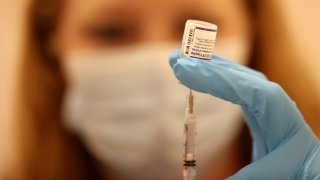
Three studies released Friday offered more evidence that COVID-19 vaccines are standing up to the omicron variant, at least among people who received booster shots.
They are the first large U.S. studies to look at vaccine protection against omicron, health officials said.
The papers echo previous research — including studies in Germany, South Africa and the U.K. — indicating available vaccines are less effective against omicron than earlier versions of the coronavirus, but also that boosters significantly improve protection.
The first study looked at hospitalizations and emergency room and urgent care center visits in 10 states, from August to this month.
Get top local stories in DFW delivered to you every morning. >Sign up for NBC DFW's News Headlines newsletter.
It found vaccine effectiveness was best after three doses of the Pfizer or Moderna vaccines in preventing COVID-19-associated emergency department and urgent care visits. Protection dropped from 94% during the delta wave to 82% during the omicron wave. Protection from just two doses was lower, especially if six months had passed since the second dose.
The second study focused on COVID-19 case and death rates in 25 states from the beginning of April through Christmas. People who were boosted had the highest protection against coronavirus infection, both during the time delta was dominant and also when omicron was taking over.
Those two articles were published online by the Centers for Disease Control and Prevention.
The Journal of the American Medical Association published the third study, also led by CDC researchers. It looked at people who tested positive for COVID-19 from Dec. 10 to Jan. 1 at more than 4,600 testing sites across the U.S.
Three shots of the Pfizer and Moderna vaccines were about 67% effective against omicron-related symptomatic disease compared with unvaccinated people. Two doses, however, offered no significant protection against omicron, the researchers found.
“It really shows the importance of getting a booster dose,” said the CDC’s Emma Accorsi, one of the study’s authors.
___
The Associated Press Health & Science Department receives support from the Howard Hughes Medical Institute’s Department of Science Education. The AP is solely responsible for all content.

